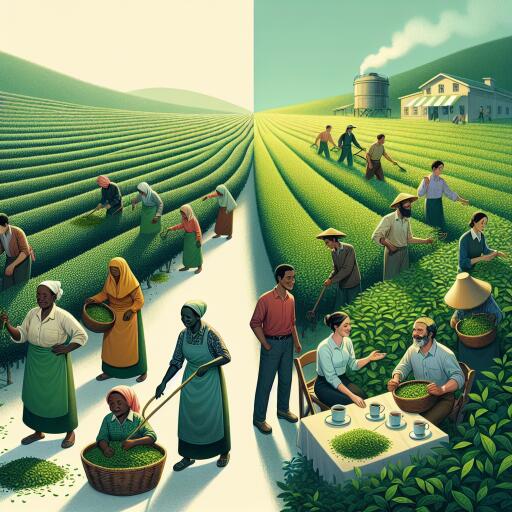In the tranquil village of Samdrupcholing, nestled within the lush landscapes of Trongsa, the heritage of green tea cultivation flourishes, predominantly under the careful stewardship of local women. These industrious women have become the backbone of the Samdrupcholing Ngoja Tshonglay Detshen, a cooperative that has garnered recognition for its superior green tea, rooted in the fertile grounds at the foot of Trongsa’s Black Mountain.
The cooperative’s journey began in April 2009, initiated by 27 founding members and has since expanded to include 34 dedicated women. This growth is not just a testament to the cooperative’s success but also highlights its distinction as an all-female entity within the community. The lineage of the green tea they nurture traces back to the esteemed Samdrupcholing Palace, a heritage that local elders, like 86-year-old Karchungla, recall with reverence, reminiscing about the saplings once harvested from the palace gardens.
Initially planted by the Department of Forest and Park Services as a soil stabilizing measure, the green tea has transformed into a vital source of livelihood for the community. The cooperative, under Chairperson Lhamo’s visionary leadership, has become a beacon of women’s leadership in agriculture, encompassing members aged between 20 to 81, all united in their mission to preserve and perpetuate the legacy of Bhutanese green tea.
The commercial success of the tea has significantly uplifted the community, particularly its women, with Lhamo herself having benefited from extensive training in both national and international contexts. The cooperative’s commitment to organic cultivation and the inherent health benefits of their green tea have propelled demand, elevating community prosperity.
This unwavering dedication was internationally recognized in 2018 when the cooperative was awarded the Best Green Tea Producers Award by the Government of India. Further bolstering their capabilities, the government’s support has enabled members to undertake training in notable tea-producing countries, including Nepal, Japan, China, and India, broadening their market reach and setting Bhutanese green tea on the global stage.
The conducive environment of Samdrupcholing, marked by minimal wildlife disturbances, provides an ideal setting for tea cultivation, a factor that has simplified the production process and empowered local women. The green tea plants, once established, promise a sustainable yield for up to 40 years, offering long-term benefits and underscoring the role of women in sustaining this cultural heritage.
Commercial activities have brought transformative changes, with members like Sonam, a single mother, finding newfound financial stability. Her annual earnings from the cooperative enable her to support her daughter’s education, reflecting the significant impact the cooperative has on its members’ lives.
Beyond individual prosperity, the cooperative has sparked employment opportunities, with even school-going children earning during the tea leaf plucking season. This fosters a sense of responsibility and contributes to their overall development, while supplementing family incomes.
2019 marked a pinnacle year for the cooperative, generating over Nu 4 million in revenue from green tea and saplings, with members earning between Nu 70,000 to Nu 500,000. This success has not only provided financial flexibility for members like Pelden but has also fueled aspirations for expanding their tea plantations and venturing into international markets, particularly in East Asia.
Despite challenges in establishing partnerships with international companies and penetrating markets such as the Asia-Pacific Tea Market, the cooperative is determined to diversify its products, including introducing butter tea leaves, Oolong tea, black tea, and tea bags. This strategy not only meets consumer preferences but also contributes to Bhutan’s tea industry sustainability and self-sufficiency.
The story of the Samdrupcholing Green Tea cooperative illustrates the profound impact of collective action, especially on women’s economic and social empowerment within rural communities. Their success promotes social equality, reduces poverty, and preserves Bhutanese heritage, spotlighting the essential role of village cooperatives in driving socio-economic progress.
As this cooperative continues to thrive, it serves as a testament to the potential of women-led enterprises in transforming local economies and societies, celebrating the significant strides made toward rural livelihood enhancement and cultural preservation in Bhutan.
